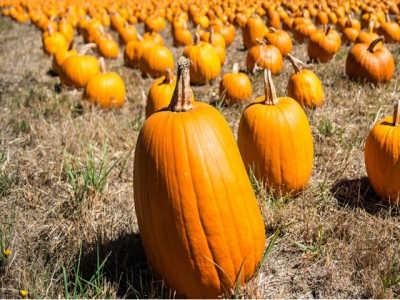7 Tips for Finding the Perfect Pumpkin

Even with the soothing reassurance of hot apple cider, finding a solid pumpkin at the pumpkin patch is a daunting task.
Luckily, Joy Barlogio of Jack Creek Farms knows a thing or two about picking the best fruit among the dry vines. Her family has 115 years of pumpkin growing experience and she built allaboutpumpkins.com as a guide to pumpkin lovers everywhere. With Halloween just around the corner, this is the money weekend for Joy and her family. Hundreds are already making the drive up from the densely populated parts of Southern California, bringing kids looking for the very best pumpkin to greet trick-or-treaters. Meanwhile, parents can sort through the farm’s culinary varieties for the perfect thick-skinned addition to the pantry.
Here are seven tips from Joy for those planning a similar schlep to the pumpkin patch.
1. Know What You Want
The pumpkins and squashes at Jack Creek Farms pretty much serve two exclusive purposes: cooking or decoration. “One thing that I really encourage people to do is never make a pie from a jack-o’-lantern,” says Joy. “We have so many people who are told they can make a pie from their jack-o’-lanterns after Halloween and the pie comes out stringy, watery and without a whole lot of flavor other than the waxy flavor of a burning candle.” Ick.
Joy encourages people coming to the patch to have a plan for their pumpkins and squashes. Want something Junior can just drive a knife into? There’s pumpkin for that. Want a pie? There’s a pumpkin and a squash for that. Want some autumnal ornaments? Take a gander in the gourds. It’s easy to get lost in the diverse world of pumpkin things, so know what you want before you get there.
2. With Jack-o’-Lanterns, Delay the Decay
When looking for the best jack-o’-lantern, choose the one that will decompose the slowest. “Choose a pumpkin that’s firm and has its stem intact,” says Joy. “Squeezing the pumpkin can tell you how long it’s going to sit on your porch — any soft spots and it won’t last long. And a strong sturdy stem indicates a healthy pumpkin. Pumpkins that were stressed for water or nutrients have a stem that is brittle and breaks off easily.” Bottom line: steer away from soft spots and dry, thin stems
3. Go for the Heaviest of the Culinary Varieties
Obesity is a good thing in culinary pumpkins, especially if you are planning to store them for a while. “You should always pick one that feels heavy for its size because that’s going to mean that it has more flesh,” explains Joy. Not only do you get more food, but because squashes and pumpkins dehydrate through the skin, a fatter pumpkin will only get sweeter over a few months on the back of the counter.
4. Never Plant Gardens with Leftover Seeds
Joy can’t speak for all pumpkin patches, but Jack Creek Farms grows 120 varieties of pumpkins packed into tight rows. The bees from the family hive also love visiting the pumpkin flowers before they grow into fruits, cross-pollinating gourds with squashes and squashes with pumpkins. The upshot is you have no guarantee a seed from inside a pumpkin will grow into anything useful. “We laughingly call those pumpkin combinations ‘Whats-It’s’,” says Joy. “We sell them at the farm on a discount.”
5. It’s Okay to Overbuy
Joy thinks people don’t realize how easily pumpkin flesh freezes. “We recommend that people chunk up [the pumpkin or squash meat], bake it until it’s tender, mash it to a pulp, and then portion the pulp into plastic bags. You can even portion out the exact number of cups you’d need for your favorite recipe.” Those bags can then be flattened and stacked in the freezer, promising delicious pumpkin pancakes and pies all year long.
6. Experiment
With so many varieties, there’s always a squash or pumpkin someone hasn’t tried. Joy recommends Carnival squash for savory soups or ravioli, Kabachca varieties for soups and stews, and spaghetti squash for the modern gluten-free couple looking for a pasta alternative. Joy’s comprehensive list of all pumpkins, squashes and gourds provide many more ideas for the curiously inclined
7. Don’t Let a Rotten Pumpkin go to Wast
Cattle across the road from Jack Creek Farms love old pumpkin scraps. The same goes for chickens, pigs or just about any other farm animal. In her humble opinion, old jack-o’-lanterns, “either need to go to livestock or hit the compost pile.”
Có thể bạn quan tâm
 How to harden seedlings
How to harden seedlings Seedlings need to be hardened to enable the plants to survive in the new environment where they are planted. hardening has another advantage.
 Understanding spray mixtures
Understanding spray mixtures With spray adjuvants, many farmers think that mixing a sticker and a wetter/spreader into the water are the same thing. This is certainly not true.
 Growing Brussels sprouts
Growing Brussels sprouts Brussels sprouts is a luxury item not part of our daily cuisine and usually reserved for special treats. It is generally well known that this crop is a dedicate